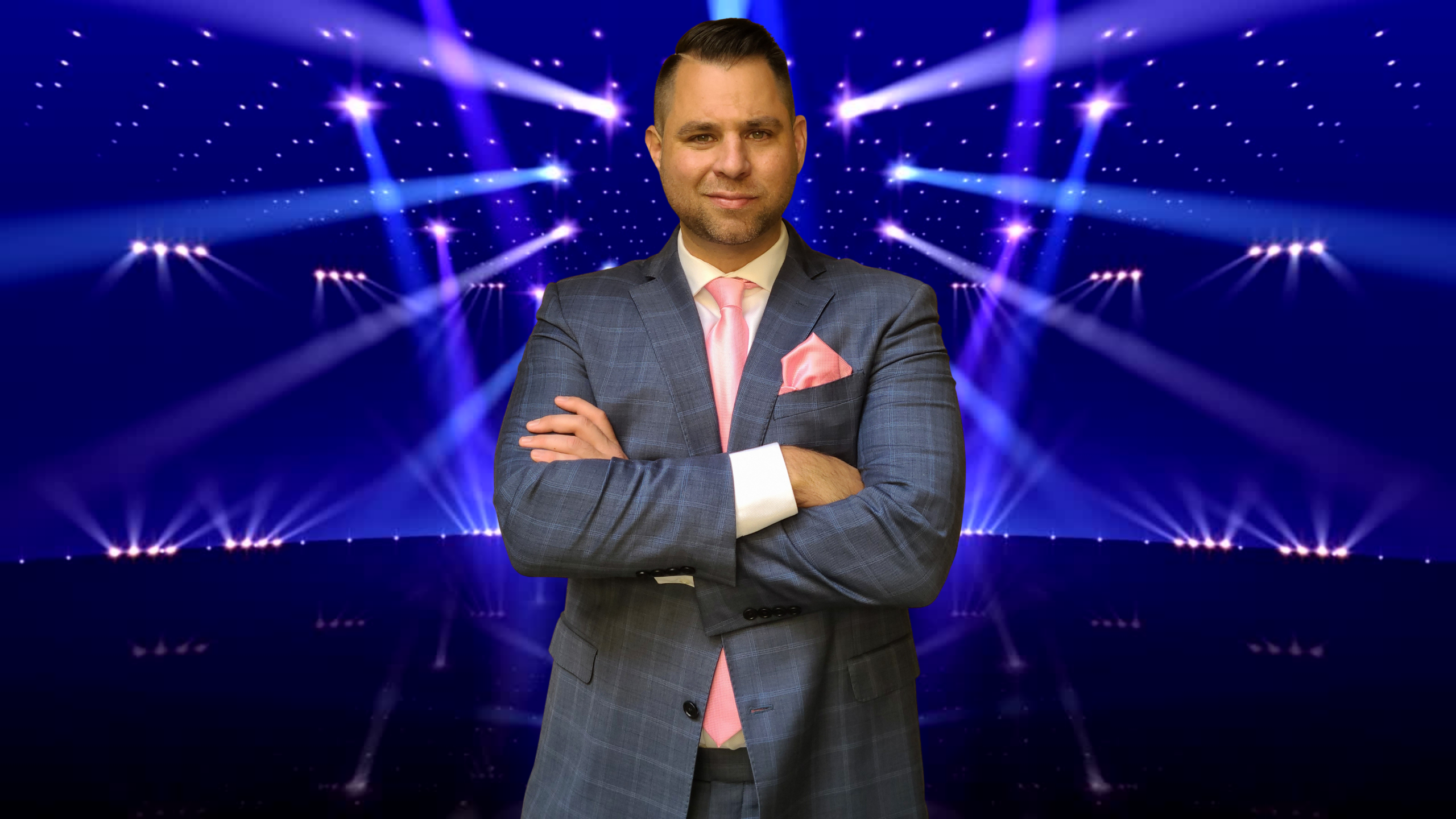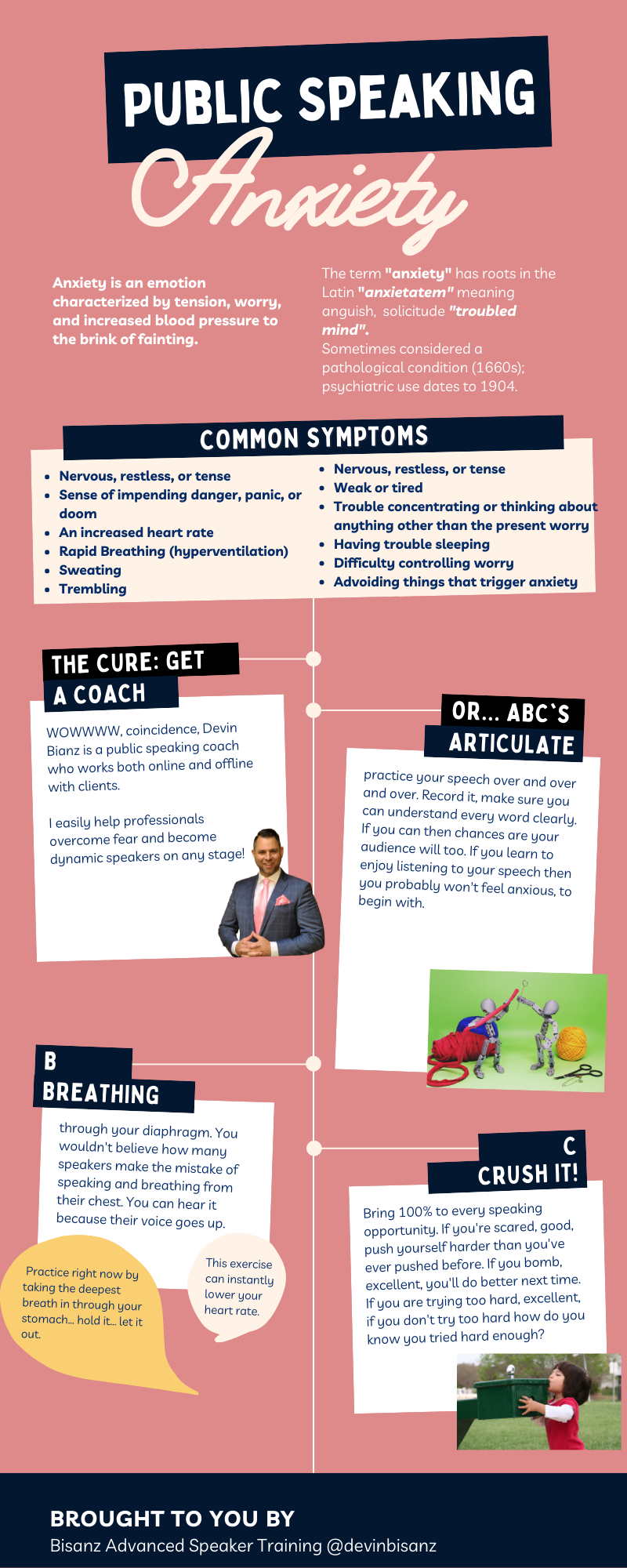How to Overcome Anxiety When Public Speaking
If I had $500 for every time somebody told me they get anxious when they have to present then it'd have a Lamborghini.
What is anxiety?
Anxiety is an emotion characterized by tension, worry, and increased blood pressure to the brink of fainting.
Common public speaking anxiety signs and symptoms include:
- Nervous, restless, or tense
- Panic
- An increased heart rate
- Rapid Breathing (hyperventilation)
- Sweating
- Trembling
- unconfirmed severe diarrhea
- Weak or tired
- Trouble concentrating or early onset ADHD
- Having trouble sleeping
- Difficulty controlling worry
- The urge to avoid things that trigger anxiety
- All those things at once
Now, you can fact-check me on this but I believe Dr. Richard Bandler (co-founder of NLP) says, "Anxiety is a fear of the future."
It makes sense to me and besides, it's hard to worry about the past.
Think about it. When it comes to public speaking anxiety, what are you doing?
Worrying about what's going to happen, the worst case scenario, criticism, the future.

What if you suck? What if you blow so hard you could pop a Whoopie Cushion? What if, what if, what if you never knew what it was like to be brave?
There is a handful of reasons this might happen:
- You have no experience
- You've had no formal training
- It's a huge audience
- You are naturally shy
- You would rather have your larynx cut out with a dull knife then do a presentation
- It's a competition and the competitors are good
- You winged it
If you ask me, number 2 is more important than all the rest because let's take number 1 for example; there are plenty of experienced speakers who have bad habits and are shitty presenters.
In fact, there are professional speakers who pop 100 Whoopie Cushions a year! I've seen keynote speakers I wanted to boo off stage. People have wanted to do the same to me I'm sure.
That's a fact.
2 Ways of Overcoming Anxiety When Speaking in Public.
1. Get A Coach!
WOWWWW, coincidence, I am a public speaking coach who works both online and offline with clients.

Too cheap to pony up the cost of a few coffees?
Did you know... apparently, severe bouts of anxiety last approximately 60 seconds?
In my experience It seems I've had anxiety last for a week at a time, I've had moments where I've almost fainted but I did eat some natural, organic, cookies that day.
2. The Hard Way to Overcome Anxiety is to Practice the ABC's
- Articulate
- Breathe
- Crush it- give it 100%, and not just the moments you speak.
Articulate: read out loud your speech over and over and over. You have to do the speech regardless, there's no reason not to do your best. Record yourself with audio to listen for pacing and vocal variety, listen back, you'll HATE it! That's what I'm saying this is the hard way.
It would be much easier to get a coach and have THEM LISTEN.
Breathe: through your diaphragm. You wouldn't believe how many speakers make the mistake of speaking and breathing from their chest. You can hear it because their voice squeaks like they are speaking on the in breath.
Get in the habit of deep abdominal breathing. Practice right now by taking the deepest breath in through your stomach... hold it... let it out. This exercise can instantly lower your heart rate.
I don't find that breathing cures anxiety. It might help get control but that feeling is still there. I still have to go pee like I have a bladder infection.
Crush it: the number one mistake new speakers make is hiding behind notes, or mumbling through it. That will only harm the self esteem. That's like planning to fail.
I can't relate to this one. Wishing to fail doesn't make sense because you are there whether you want to be or not. You're there so JUST BRING IT. Shout to the rafters and if you try too hard excellent! Most people will NEVER try hard enough!
I always say, "Start strong, stay strong, finish strong, especially if you don't know what the audience is thinking, especially if you are popping a Whoopie Cushion!"
I'll tell you what. If you perfect practice the ABC's then you're going to be a better communicator in general.
Here is all that information summed up into a beautiful infographic!

In closing, being articulate, having a breathing strategy, and bringing 100% to every speech is a game-changer, but if it is not enough the only way to truly get better at the speaking game is to get into the speaking game and why not start right here on the web?

